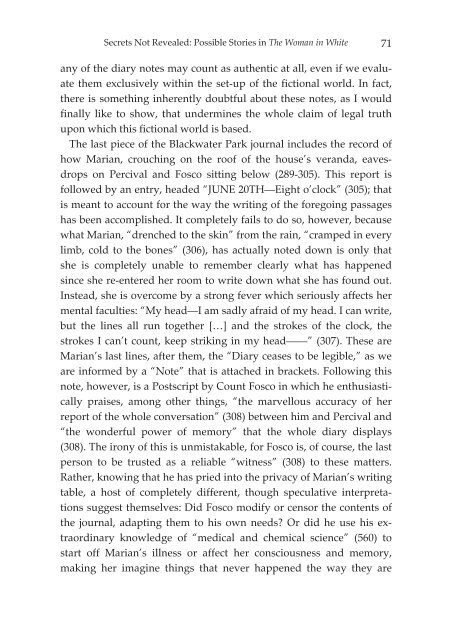Connotations 18.1-3 (2008/2009)
Connotations 18.1-3 (2008/2009)
Connotations 18.1-3 (2008/2009)
You also want an ePaper? Increase the reach of your titles
YUMPU automatically turns print PDFs into web optimized ePapers that Google loves.
Secrets Not Revealed: Possible Stories in The Woman in White<br />
any of the diary notes may count as authentic at all, even if we evaluate<br />
them exclusively within the set-up of the fictional world. In fact,<br />
there is something inherently doubtful about these notes, as I would<br />
finally like to show, that undermines the whole claim of legal truth<br />
upon which this fictional world is based.<br />
The last piece of the Blackwater Park journal includes the record of<br />
how Marian, crouching on the roof of the house’s veranda, eavesdrops<br />
on Percival and Fosco sitting below (289-305). This report is<br />
followed by an entry, headed “JUNE 20TH—Eight o’clock” (305); that<br />
is meant to account for the way the writing of the foregoing passages<br />
has been accomplished. It completely fails to do so, however, because<br />
what Marian, “drenched to the skin” from the rain, “cramped in every<br />
limb, cold to the bones” (306), has actually noted down is only that<br />
she is completely unable to remember clearly what has happened<br />
since she re-entered her room to write down what she has found out.<br />
Instead, she is overcome by a strong fever which seriously affects her<br />
mental faculties: “My head—I am sadly afraid of my head. I can write,<br />
but the lines all run together […] and the strokes of the clock, the<br />
strokes I can’t count, keep striking in my head——” (307). These are<br />
Marian’s last lines, after them, the “Diary ceases to be legible,” as we<br />
are informed by a “Note” that is attached in brackets. Following this<br />
note, however, is a Postscript by Count Fosco in which he enthusiastically<br />
praises, among other things, “the marvellous accuracy of her<br />
report of the whole conversation” (308) between him and Percival and<br />
“the wonderful power of memory” that the whole diary displays<br />
(308). The irony of this is unmistakable, for Fosco is, of course, the last<br />
person to be trusted as a reliable “witness” (308) to these matters.<br />
Rather, knowing that he has pried into the privacy of Marian’s writing<br />
table, a host of completely different, though speculative interpretations<br />
suggest themselves: Did Fosco modify or censor the contents of<br />
the journal, adapting them to his own needs? Or did he use his extraordinary<br />
knowledge of “medical and chemical science” (560) to<br />
start off Marian’s illness or affect her consciousness and memory,<br />
making her imagine things that never happened the way they are<br />
71

















